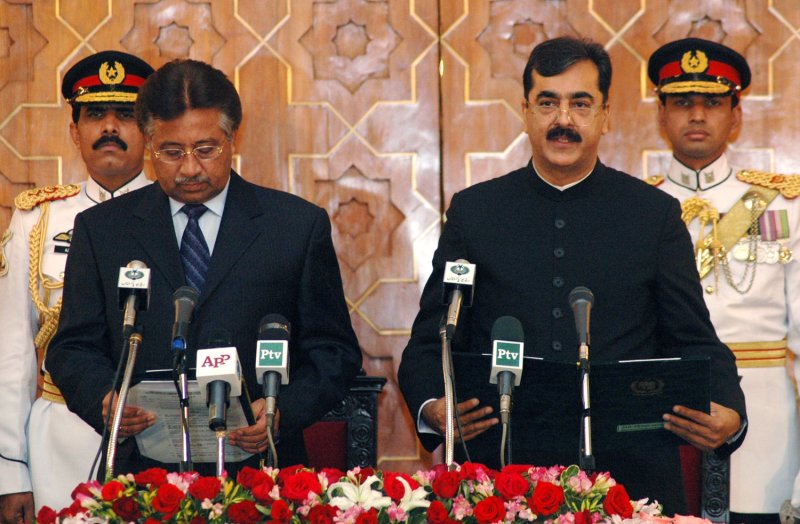Then Pakistani President Pervez Musharraf (L) swears in Yousaf Raza Gilani as the new Prime Minister in Islamabad on March 25, 2008. (UPI File Photo/Sajjad Ali Qureshi) |
License Photo
ISLAMABAD, Jan. 2 (UPI) -- Pakistan's former military ruler, ordered to appear in a court Thursday for his treason trial, was instead taken to a hospital apparently after becoming ill.
Retired army Gen. Pervez Musharraf, 70, who had earlier failed to appear twice at the special court in Islamabad due to security threats, was on his way from his farmhouse to the courtroom as he had been ordered when he complained of chest pain, Geo News reported.
Musharraf was later taken to the Armed Forces Institute of Cardiology in the nearby garrison town of Rawalpindi, police said.
His lawyer told CNN Musharraf was taken to the hospital on his doctor's orders.
For the third time since last week, the hearing was postponed, this time until Monday. On the previous two occasions last week and on Wednesday, Musharraf failed to appear in court after police found explosive materials on the route from his farmhouse to the court.
Pakistan's Dawn News said the three-judge special court had summoned Musharraf's appearance Thursday, warning warrants for his arrest would be issued if he did not comply with its order.
Security had been tightened along the route from Musharraf's residence up to the courthouse and in the surrounding areas, the report said. Musharraf's lawyers had asked the court to exempt him from appearing due to security concerns.
Geo News said more than 1,000 personnel had been deployed to ensure security.
The treason charge relates to Musharraf's suspension of the constitution and imposition of emergency rule in 2007. He held power until 2008 following a military coup in 1999.
If convicted on the charge, Musharraf could either face the death penalty or life imprisonment. He has dismissed the charge as politically-motivated.
Last Sunday at his residence, where he has remained under house arrest on various charges since his return from exile in March, Musharraf told foreign media reporters the treason charge appeared to be a vendetta.
Musharraf assumed power in 1999 following a coup that ousted Prime Minister Nawaz Sharif. Sharif returned as prime minister for the third time after winning elections last May.
The former military ruler also told the foreign reporters the country's military is "extremely worried" about his prosecution and that they were with him in the case.
Pakistan has been ruled by various military rulers for nearly half its history since becoming independent in 1947. Musharraf's trial will be the first time a former military ruler will be tried for treason.
Musharraf also claimed he had been treated unfairly since his return from exile in March, although he had done much for the development and welfare of the people during his rule.
On the declaration of emergency rule, he said had acted with support from top civilian and military officials as it was needed to check the judiciary from interfering in his efforts to fight Islamist terrorism.















